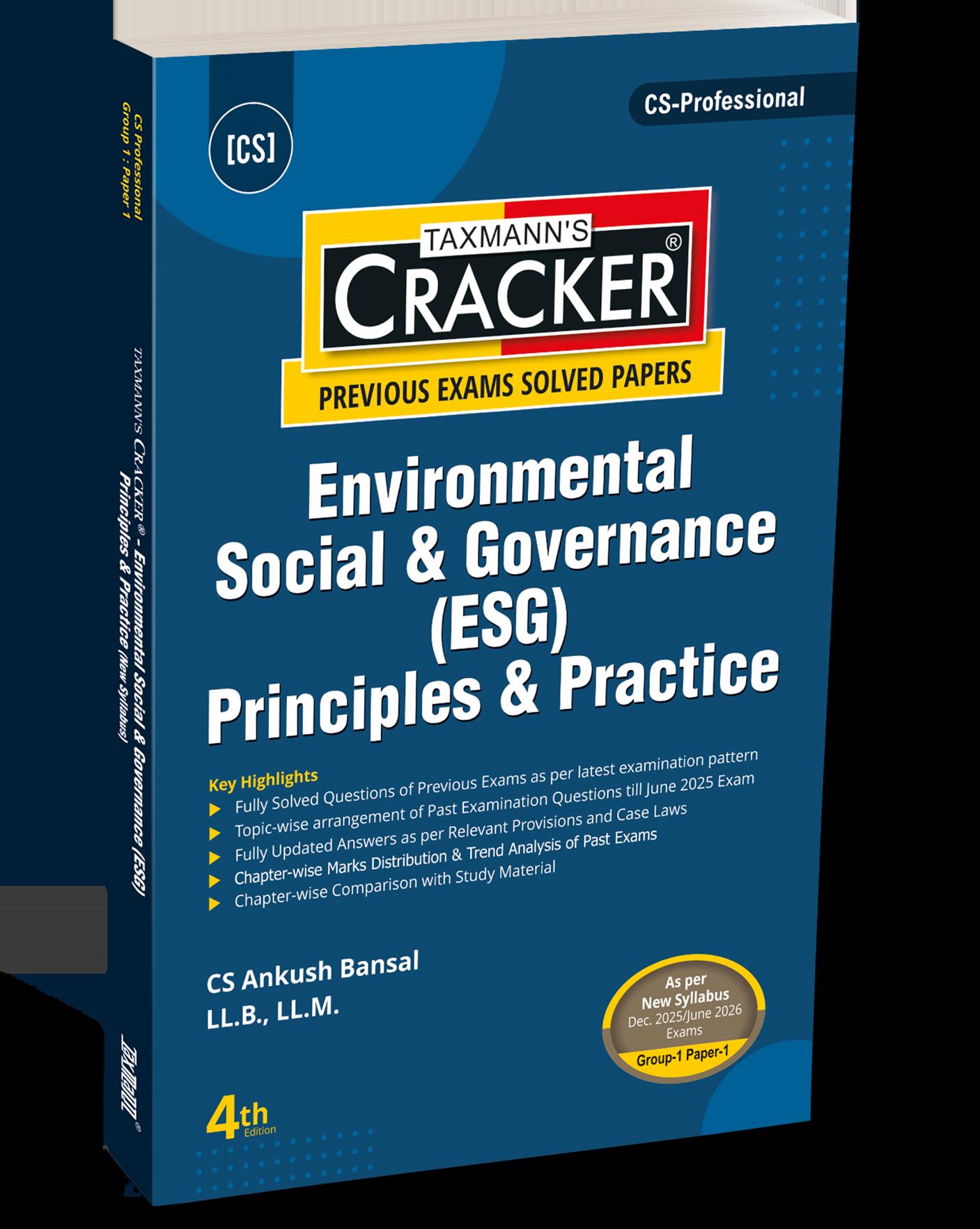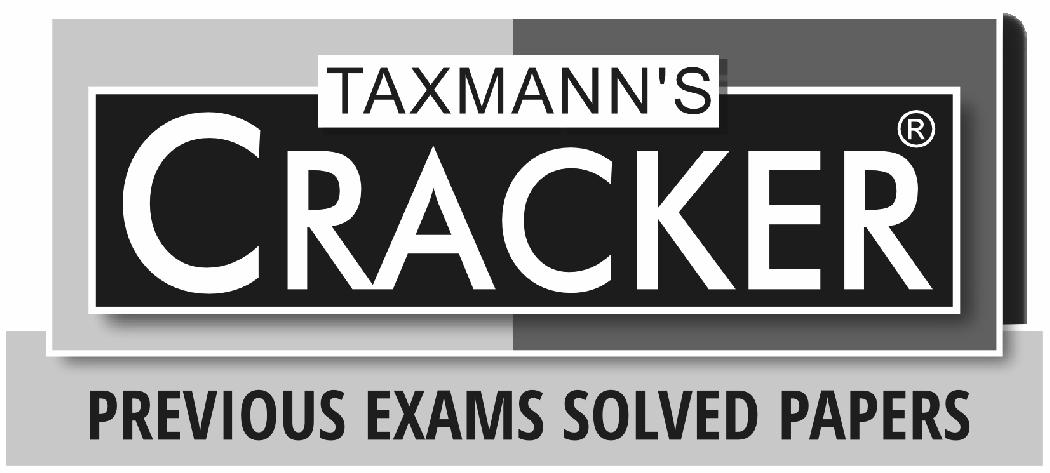




© All rights reserved
Price : ` 395
Fourth Edition : June 2025
Published by :
Taxmann Publications (P.) Ltd.
Sales & Marketing :
59/32, New Rohtak Road, New Delhi-110 005 India
Phone : +91-11-45562222
Website : www.taxmann.com
E-mail : sales@taxmann.com
Regd. Office : 21/35, West Punjabi Bagh, New Delhi-110 026 India
Printed at :
Tan Prints (India) Pvt. Ltd.
44 Km. Mile Stone, National Highway, Rohtak Road Village Rohad, Distt. Jhajjar (Haryana) India
E-mail : sales@tanprints.com
Disclaimer
Every effort has been made to avoid errors or omissions in this publication. In spite of this, errors may creep in. Any mistake, error or discrepancy noted may be brought to our notice which shall be taken care of in the next edition. It is notified that neither the publisher nor the author or seller will be responsible for any damage or loss of action to any one, of any kind, in any manner, therefrom. No part of this book may be reproduced or copied in any form or by any means [graphic, electronic or mechanical, including photocopying, recording, taping, or information retrieval systems] or reproduced on any disc, tape, perforated media or other information storage device, etc., without the written permission of the publishers. Breach of this condition is liable for legal action.
For binding mistake, misprints or for missing pages, etc., the publisher’s liability is limited to replacement within seven days of purchase by similar edition. All expenses in this connection are to be borne by the purchaser. All disputes are subject to Delhi jurisdiction only.
Chapter
PART I GOVERNANCE AND SUSTAINABILITY


BOARD COMPOSITION
Q1. EXCEL Finance Ltd. a listed entity, along with other companies, has promoted a company called ACTIVE Trading Ltd. Following is the composition of Board of ACTIVE Trading Ltd. a listed company as on 31st March, 2022:
Mr. A – Non-Executive Chairman
Mr. B – Managing Director
Mr. C – Executive Director
Mr. D – Nominee Director (Standard Lease Finance Ltd.)
Ms. E – Independent Director
Mr. Z, an Independent Director, has resigned w.e.f. 28th Feb., 2022. Mr. A, Chairman of the company is also an independent director of EXCEL Finance Ltd., a listed Company. Examine the composition of the Board of ACTIVE Trading Ltd. and advise for due compliance with various regulatory provisions? [Dec. 2022 (5 Marks)]
Ans. LEGAL PROVISION: Composition as per Companies Act, 2013:
Pursuant to Section 149(1) provides every company shall have a Board of Directors consisting of individuals as directors and shall have –
At least 3 directors in the case of a public company;
At least 2 directors in the case of a private company; and
At least one director in the case of a One Person Company; and
A maximum of 15 directors provided that a company may appoint more than fifteen directors after passing a SPECIAL RESOLUTION.
Note: Maximum directors’ clause is not applicable to Government Company and Section 8 Company.
Pursuant to Section 149(4) provides that every public listed company shall have atleast 1/3rd of total number of directors as INDEPENDENT DIRECTORS and Central Government may prescribe the minimum number of independent directors for any class or classes of companies.
3.1
3.2 ENVIRONMENTAL, SOCIAL & GOVERNANCE (ESG) - PRINCIPLES & PRACTICE
LEGAL PROVISION: Composition as per SEBI (LODR) Regulations, 2015: Regulation 17(1)(b) provides that the composition of board of directors of the listed entity shall be as follows: where the chairperson of the board of directors is a non-executive director, at least 1/3rd of the board of directors shall comprise of Independent Directors. where the listed entity does not have a regular non-executive chairperson, at least half of the board of directors shall comprise of Independent Directors. where the regular non-executive chairperson is a promoter of the listed entity or is related to any promoter or person occupying management positions at the level of board of director or at one level below the board of directors, then more than 50% of the board shall be Independent.
An Independent Director who resigns or is removed from the board of directors of the listed entity shall be replaced by a new Independent Director by listed entity at the earliest but not later than 3 months from the date of such vacancy.
ANALYSIS:
In the case presented, there are totally 6 directors till 28.02.2022 out of which 2 are executive and 4 are non-executive thus requirement of 50% of Non-Executive Directors is complied.
Mr. A is the Non-Executive Chairman and thus Board is required to have at least 1/3rd as Independent Directors which condition is satisfied till 28.02.2022, Mr. Z has resigned.
CONCLUSION:
Ms. E is there on Board; the requirement of woman director is also complied. And there is a requirement for the appointment of an independent director.
Q2. Corporate Boards are involved in woman empowerment comment. [June 2016 (5 Marks)]
Ans. In order to improve participation of women on board and to promote women empowerment and bring gender diversity, a variety of provisions have been introduced under Companies Act, 2013 and SEBI (LODR)
Proviso to the Section 149(1) of the Companies Act, 2013 provides that there shall be shall have at least 1woman director.
Provided further that such class or classes of companies as prescribed under Rule 3 of the Companies (Appointment and Qualifications of Directors) Rules, 2014.
Women Director: At least 1woman director shall be appointed in every listed company within one year from the commencement of the Act.
Every other public company having paid up share capital of Rs. 100 crores or more or
Turnover of 300 crores or more as on the last date of audited financial statements, shall appoint at least 1 woman director within one year from the implementation of the Act.
CONCLUSION: Hence, from aforesaid it is very clear that goal of law is to improve women participation.
Q3. What is the ideal Board size according to Companies Act as per NSE and Proxy Advisory Guidelines? [Scoring Question]
Ans. The ideal Board Size prescribed under SEBI (LODR) are as follows;
1) Pursuant to Regulation 17(1)(c) the top 2000 listed entities shall comprise of not less than 6 directors.
2) NSE Prime Companies regarding Board Composition: The Board of Directors shall consist of a minimum of 8 Directors.
The Chairperson of the Board of Directors shall not be a Relative of the Managing Director or Chief Executive Officer of the NSE Prime Company.
The public shareholding is in excess of 50% - more than half of the Board of Directors shall comprise Independent Directors. Where the public shareholding is 50 % or less, - at least half of the Board of Directors shall comprise Independent Directors.
At least 2 Directors shall be women – one shall be independent.
3) Board Size as per Proxy Advisors Guidelines:
IiAS prefers a Board size of 6-15 members
InGovern prefers a Board size of 7-15 members.
SES prefers a Board size of 6-15 members.
Q4. SBL Limited is an unlisted public company having paid-up share capital of 10 crores and turnover of 300 crores. The Board of directors comprise of one nominee director, five non-executive directors, two non-resident directors and one managing director. Is the composition of the Board of directors valid? Answer with reasons? [Dec. 2021 (5 Marks)]
Ans. FACT OF THE CASE:
Unlisted Public Company having paid-up share capital of Rs. 10 crores and turnover of Rs. 300 crores.
3.4 ENVIRONMENTAL, SOCIAL & GOVERNANCE (ESG) - PRINCIPLES & PRACTICE
The Board of directors comprise of 1 nominee director, 5 non-executive directors, 2 non-resident directors and 1 managing director.
LEGAL PROVISION: Refer Ques 1
Section 149(6) of the Companies Act, 2013 specifically excluded nominee director from being considered as Independent. Hence, nominee director cannot be treated as an Independent Director.
CONCLUSION: As per the above legal provisions, the present composition of Board of Directors is not in compliance with the provisions of the Companies Act, 2013 as the Company satisfying the threshold criteria given above should have at least:
2 Independent directors, and 1 Women director, Therefore, it should appoint at least 2 Independent Directors and 1 women director.
Q5. M Ltd. is a listed entity having a paid-up equity share capital of Rs. 100 crores. The company has 1500 small shareholders. It received a notice from 1200 small shareholders proposing Mr. X, a small shareholder as a candidate for the post of small shareholder director. The board of directors of M Ltd. are not interested in the appointment of Mr. X as small shareholder director, as they feel that there are sufficient numbers of independent directors on the board who are taking adequate steps to protect the interests of all shareholders including small shareholders. Can such nomination be rejected? Discuss? [Dec. 2021 (3 Marks)]
Ans.
FACTS OF THE ISSUE:
The company has 1500 small shareholders
It received a notice from 1200 small shareholders proposing Mr. X, a small shareholder as a candidate.
There are sufficient numbers of independent directors on the board.
LEGAL PROVISION: Pursuant to Section 151 of the Companies Act, 2013 read with the Rules made there under provides that a listed company, may upon notice of not less than 1000 small shareholders or 1/10th of the total number of such shareholders, whichever is lower, have a small shareholders’ director elected by the small shareholders.
ANALYSIS: As per the provisions the use of “may” in both the Section and the Rules gives liberty to the Board of directors to reject the proposal.
CONCLUSION: M Ltd. has sufficient number of independent directors who are taking adequate care of the interests of all shareholders including small shareholders. Under the circumstances, the board of M Ltd. may reject the appointment of Mr. X as small shareholder director by explaining the circumstances to the shareholders and the rationale for taking such decision.
BOARD INDEPENDENCE
Q6. Whether the receipt of sitting fee for attending the board meeting by an Independent Director from a company would be considered as having pecuniary interest while considering his appointment in the holding company, subsidiary company or associate company of such company? [Dec. 2021 (3 Marks)]
Ans. Section 149(6) provides that an independent director in relation to a company, means a director other than a managing director or a whole-time director or a nominee director, - who has or had no pecuniary relationship, other than remuneration as such director or having transaction not exceeding 10% of his total income or such amount as may be prescribed, with the company, its holding, subsidiary or associate company, or their promoters, or Directors, during the 2 immediately preceding financial years or during the current financial year;
General Circular by MCA provides that:
1) In case, a company carries out transactions in the ordinary course of business at Arm’s length price with an Independent Director, such Independent Director would not be said to have ‘pecuniary relationship’ with the company.
2) In case of Independent Directors, ‘Pecuniary Relationship’ does not include receipt of remuneration by way of sitting fees
Therefore receipt of sitting fees would not be considered as pecuniary interest while considering his appointment in the holding company, subsidiary company or associate company of such company since Such a relationship may adversely influence an Independent Director’s objectivity when it comes to taking key decisions and also results in conflict of interest of the concerned director.
Q7. In Pramod Ltd., vacancy of an independent director arose on 15th June, 2014. In the Board meeting held on 14th October, 2014, the Board of directors unanimously passed a resolution to appoint one of the nominee directors as an independent director for next two consecutive terms. Enumerate the selection criteria of an independent director. [Dec. 2015 (5 Marks)]
3.6 ENVIRONMENTAL, SOCIAL & GOVERNANCE (ESG) - PRINCIPLES & PRACTICE
Ans.
FACT OF THE CASE
1) In Pramod Ltd there is a vacancy of independent director .
2) The Board of Directors unanimously passed a resolution to appoint nominee Director as an independent director for two terms.
LEGAL PROVISIONS
Pursuant to Section 149(6) provides that an independent director in relation to a company, means a director other than a managing director or a whole-time director or a nominee director.
1) who as per Board, is a person of integrity and possesses relevant expertise and experience;
2) who is or was not a promoter nor related to promoter of the company or its holding, subsidiary or associate company.
3) who has or had no pecuniary relationship, other than remuneration as such director or having transaction not exceeding 10% of his total income or such amount as may be prescribed with Holding, Subsidiary, associate
4) none of whose relatives is holding any security of or interest, is indebted to the company, has given a guarantee or provided any security in connection with the indebtedness of any third person, has any other pecuniary transaction or relationship with the company, or its subsidiary, or its holding or associate Co.
5) who, neither himself nor any of his relative holds or has held the position of a key managerial personnel or is or has been employee of the company, Holding, Subsidiary or Associate is or has been an employee or proprietor or a partner, in any of the 3 financial years immediately preceding the financial year.
6) holds together with his relatives 2% or more of the total voting power of the company;
7) is a Chief Executive or director, by whatever name called, of any Non-Profit Organization [NGO] that receives 25% or more of its receipts from the company, any of its promoters, Directors or its holding, subsidiary or associate company or that holds 2% or more of the total voting power of the company;
8) who possesses such other qualifications as prescribed under Rule 4 of the Companies (Appointment and Qualifications of Directors) Rules, 2014.
CONCLUSION: Board of Directors of Pramod Ltd. has appointed one of the nominee directors as an independent director. The Director so appointed cannot be considered independent as he is a Nominee Director Hence, the appointment made by the Board of Directors of Pramod Ltd. is not valid.
Q8. What are the parameter of independence to be considered by Proxy Advisors? [Scoring Question]
Ans.
1) IiAS
IiAS will not treat the following directors as independent: Directors who have cross linkages with each other across multiple Boards (Board interlock).
Those who do not satisfy the eligibility criteria laid down in Section 149(6) of the Act and Regulation 16(1)(b) of the SEBI (LODR) Regulations, 2015. Representatives of large shareholders and if they are not appointed on the Board as a nominee may be considered independent. directors who were earlier on the Board as nominees may be considered independent once the investor has sold its stake. Retired IAS officers/civil servants will also be considered Board of Public Sector Enterprises.
2) InGovern
IDs should have no professional relationship with the company apart from sitting fees or any form of commission.
For companies which have had major governance failures, InGovern does not recommend reappointment of same IDs.
3) SES
Independent Director (ID) of Company must not have any pecuniary relationship with the Company, except for Directors’ remuneration.
Q9. ‘The Independent Directors of the company shall hold at least one meeting in a financial year without the attendance of non-independent director and member of management.’ Discuss the statement and also mention the agenda items to be taken upon such a meeting as per the relevant provisions of SEBI (LODR) Regulations, 2015. [Dec. 2022 (5 Marks)] OR
Q10. What are the qualificatons of independent Directors(ID)? Describe provisions under Companies Act , 2013 about separate meetings of an ID? [Scoring Question]
OR
Q11. Are there any separate provisions of meeting of independent director? [Scoring Question]
3.8 ENVIRONMENTAL, SOCIAL & GOVERNANCE (ESG) - PRINCIPLES & PRACTICE
Ans. Qualifications of an independent diector are as follows;
LEGAL PROVISIONS
Pursuant to Section 149(6) provides that an independent director in relation to a company, means a director other than a managing director or a whole-time director or a nominee director.
1) Who as per Board, is a person of integrity and possesses relevant expertise and experience.
2) who is or was not a promoter nor related to promoter of the company or its holding, subsidiary or associate company.
3) who has or had no pecuniary relationship, other than remuneration as such director or having transaction not exceeding ten per cent. of his total income or such amount as may be prescribed with Holding, Subsidiary, associate.
4) none of whose relatives is holding any security of or interest, is indebted to the company, has given a guarantee or provided any security in connection with the indebtedness of any third person, has any other pecuniary transaction or relationship with the company, or its subsidiary, or its holding or associate company.
5) who, neither himself nor any of his relative holds or has held the position of a key managerial personnel or is or has been employee of the company, Holding , Subsidary or Associate is or has been an employee or proprietor or a partner, in any of the three financial years immediately preceding the financial year.
6) holds together with his relatives 2% or more of the total voting power of the company.
7) is a Chief Executive or director, by whatever name called, of any non-profit organisation that receives 25% or more of its receipts from the company, any of its promoters, Directors or its holding, subsidiary or associate company or that holds 2% or more of the total voting power of the company.
8) who possesses such other qualifications as prescribed under Rule 4 of the Companies (Appointment and Qualifications of Directors) Rules, 2014.
PROVISIONS UNDER COMPANIES ACT 2013 ABOUT SEPARATE MEETINGS OF AN INDEPENDENT DIRECTOR
Pursuant to Schedule IV of Companies Act, 2013 provides that:
1) The independent directors of the company shall hold at least 1 meeting in a financial year.
2) The meeting shall be without the attendance of non-independent directors and members of management;
3) All the independent directors of the company shall strive to be present at such meeting;
4) The meeting shall have the following agenda item ; review the performance of non-independent directors and the Board as a whole; review the performance of the Chairperson of the company, taking into account the views of executive directors and non-executive directors; assess the quality, quantity and timeliness of flow of information between the company management and the Board that is necessary for the Board to effectively and reasonably perform their duties.
Q12. What is the tenure of an independent director as per Companies Act, 2013, SEBI (Listing Obligaions And Disclosure Requirements, Proxy Advisory firms and Inernational perspective ? [Scoring Question]
Ans. TENURE AS PER COMPANIES ACT 2013
Pursuant to Section 149(10)
1) An independent director shall hold office for a term up to 5 consecutive years on the Board of a company.
2) He shall be eligible for reappointment on passing of a special resolution by the company and disclosure of such appointment in the Board’s report.
3) Independent director shall not hold office for more than 2 consecutive terms.
4) Independent director shall be eligible for appointment after the expiration of 3 years of ceasing to become an independent director.
5) An independent director shall not, during the said period of 3 years, be appointed in or be associated with the company in any other capacity, either directly or indirectly.
TENURE AS PER SEBI (LISTING OBLIGATIONS AND DISCLOSURE REQUIREMENTS)
Regulation 25(2) of the SEBI (LODR) Regulations, 2015 provides that the maximum tenure of independent directors shall be in accordance with the Companies Act, 2013 and rules made thereunder.
TENURE AS PER PROXY ADVISORY FIRMS
InGovern: Independent Director may not serve on the Board for a period of more than 2 consecutive terms of 5 years each. No former independent director or A former NED should serve in the company in any capacity even if 3 years cooling off period has passed since his / her resignation.
SES: The law states that any term of the ID prior to 1st April, 2014 shall be ignored for the computation of 5 years, SES is of the opinion that the term of an ID who was already an ID as on 31st March, 2014 (‘existing IDs’) must begin from 1st April, 2014, therefore, the first term cannot exceed 31st March, 2019.
3.10 ENVIRONMENTAL, SOCIAL & GOVERNANCE (ESG) - PRINCIPLES & PRACTICE
INTERNATIONAL PERSPECTIVE
OECD set a maximum tenure of an Independent Director from 5 to 15 years (with 8-10 years most common).
Malaysian Code on Corporate Governance 2021 The tenure of an independent director does not exceed a term limit of nine years. Upon completion of the 9 years, an independent director may continue to serve on the board as a non-independent director.
Vietnamese Corporate Governance Code of Best Practices, 2019 Principle 3.4: The Board’s independent directors should serve for a maximum cumulative term of nine years.
THE LEAD INDEPENDENT DIRECTOR
Q13. Explain the role of the lead independent director to enhance Board Effectiveness. [Dec. 2022 (5 Marks)]
Ans. Lead independent director is the one out of all the independent directors who moniters the relationship between chairperson and CEO also coordinates the activities of other non-employee directors and advises the chairman.
Following is the role of Lead independent director :
1) He shall act as the principal liaison between the independent directors of the Board and the Chairman of the Board.
2) He shall develop the agenda for and preside at executive sessions of th e Board’s independent directors.
3) He shall advise the Chairman of the Board as to an appropriate schedule for Board meetings.
4) He shall approve with the Chairman of the Board the agenda for Board and Board Committee meetings.
5) He shall advise the Chairman of the Board as to the quality, quantity and timeliness of the information submitted by the Company’s management that is necessary for decision by an independent director.
6) He shall Interview, along with the chair of the Nominating and Corporate Governance Committee.
7) He shall assist the Board and Company officers in better ensuring compliance.
8) He shall serve as Chairman of the Board when the Chairman is not present.
9) Also shall Serve as a liaison for consultation and communication with shareholders.

